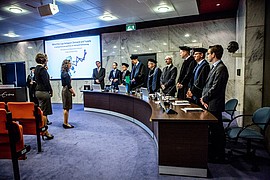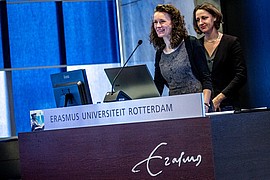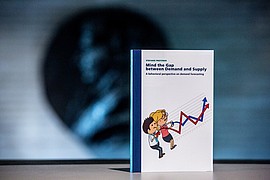PhD Defence: Stefanie Protzner

In her dissertation ‘Mind the Gap between Demand and Supply: A behavioral perspective on demand forecasting’, ERIM’s Stefanie Protzner aims to provide new insights into the role of human judgment in demand forecasting. Her dissertation is part of a growing research field in which human behavior and cognition are incorporated into analytical models of operations management. Her studies underscore the importance of understanding the underlying cognitive and motivational processes in order to devise strategies for making accurate forecasts.
Stefanie Protzner defended her dissertation in the Senate Hall at Erasmus University Rotterdam on Friday, 8 January 2016 at 11:30. Her supervisors were <link people steef-van-de-velde>Prof.dr. S. van de Velde and Dr. L. Rook. Other members of the Doctoral Committee were Prof.dr. E. Siemsen (Wisconsin), <link people daan-stam>Dr. D.A. Stam (RSM), and <link people jan-van-dalen>Dr. J. van Dalen (RSM).
About Stefanie Protzner

Stefanie Brix, née Protzner was born on October 16th, 1983 in Berlin, Germany. She obtained her Bachelor’s degree in Psychology from University of Konstanz, Germany in 2007, where she has been active as chairwoman of the local IAESTE (International Association for the Exchange of Students for Technical Experiences) committee in 2006/2007. In the summer of 2008, Stefanie moved to Rotterdam to complete the General Management Program and graduated (cum laude) with a Master of Science in Business Administration (Human Resource Management) in September 2010. Stefanie stayed in Rotterdam to pursue a Ph.D. degree under the supervision of Steef van de Velde and Laurens Rook. As part of her Ph.D. project, she spent four month at the Planning Department at Nokia Headquarters in Espoo, Finland to gather practical experience in the Sales and Operations Planning process. Stefanie presented her research at several international academic conferences including AOM (2011), EurOMA (2012), INFORMS (2013, 2014), and the Behavioral Operations Conference (2012, 2014). She was also regularly invited to present at practitioner conferences, among others as keynote speaker at the EyeOn FMCG Networking Conference. Stefanie supervised various Bachelor and Master theses, taught in MSc courses, such as Designing and Managing the Supply Chain, Supply Chain Forecasting and Operational Excellence, and co-developed and taught the Supply Chain Partnerships module in Samsung’s Executive Program. Currently, Stefanie works as Distribution Manager for H.C. Starck in Goslar, Germany.
Thesis Abstract

Prior academic research has recognized human judgment as an indispensable decision-aid in demand forecasting although it is subject to a number of biases. Therefore, it is important to understand human judgment in forecasting to explain poor forecast decisions and attenuate their negative consequences for many related operational decisions. This dissertation is part of a growing research field in which human behavior and cognition are incorporated into analytical models of operations management. It aims to provide new insights into the role of human jud gment in demand forecasting.
The functional specialization and differentiation inherent to most organizations usually shapes forecasting behavior in such a way that it benefits departmental goals and agendas. Lack of clear forecast ownership, diffused responsibilities and varying interests and incentives are often at odds with the organizational goal of producing accurate forecasts. The first study identifies and describes the potential benefits of forecast ownership and mechanically combined departmental forecasts on the tendency to over- and under-forecast demand. The findings of the second and third study show that departmental roles offer a particular frame with which forecasters interpret information and make decisions. The fourth study examines how forecasters use historic data and extrapolate information to determine future trends. The findings indicate that forecasters cannot clearly distinguish actual from illusionary trends and persistent changes from random variations in time-series.
Together these studies underscore the importance of understanding the underlying cognitive and motivational processes in order to devise strategies for making accurate forecasts.
· View and download Stefanie's dissertation
Photos: Chris Gorzeman / Capital Images


